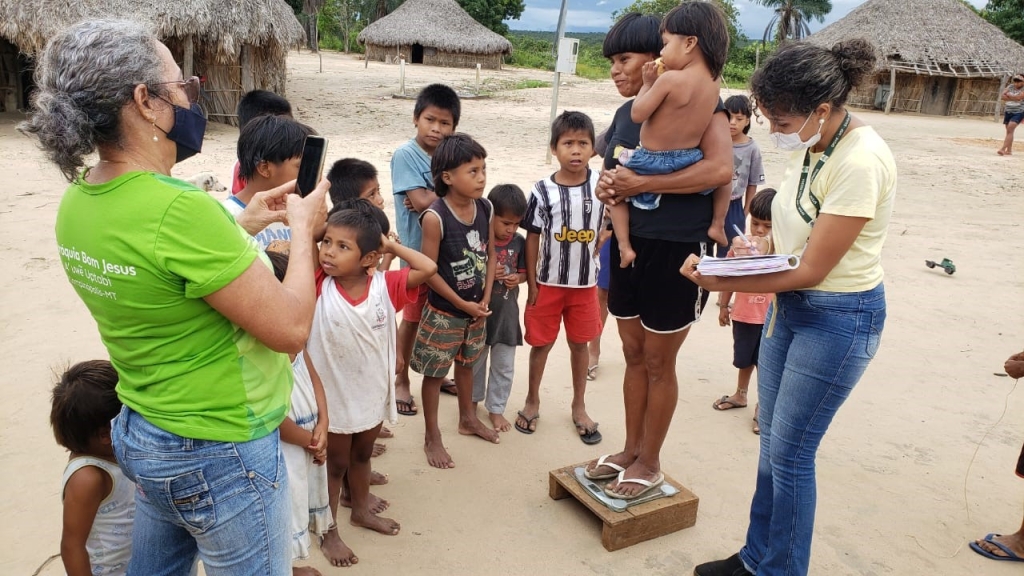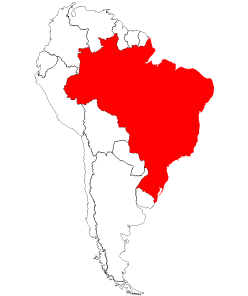BRAZIL: Indigenous children facing malnutrition receive care

Ongoing collaborative project monitors children, provides medical care
(MissionNewswire) Salesian missionaries with the Salesian Parish São Domingos Sávio, Children’s Pastoral and the Center for Indigenous Health (CASAI) are working collaboratively to address malnutrition faced by Indigenous children in the municipalities of Nova Xavantina and Campinápolis in the Brazilian state of Mato Grosso.
Father José Alves traveled with Deusmira Moreira, coordinator of Children’s Pastoral, and Delma Cristina, a nutritionist with CASAI, to visit the villages of Indigenous Xavante people. The main objective was to monitor cases of underweight children in the São Pedro health micro-area, guiding parents and referring the most serious cases to the responsible health unit.
Fr. Alves said, “This collaborative work is very good because when people leave here, they already have a list of children in the villages who have already been identified as underweight, very underweight or already suffering from malnutrition and who must be accompanied because of this.”
During the visits, the nutritionist notes the child’s low weight or malnutrition and connects the family to CASAI in Campinápolis for hospitalization. At CASAI, staff members monitor food intake and increase the children’s meals to several times a day. The goal is for children to achieve a normal weight and be able to return to their village.
Some parents do not want their children to be sent to CASAI. There is also a fear that the child or the accompanying adult may have contact with patients with other diseases, such as COVID-19.
“In cases where parents don’t want to bring their children, and we can’t force them, we give them a kit offered by the Children’s Ministry,” explained Fr. Alves. “This is a ‘soup kit’ that contains vegetables, noodles, ground meat or chicken. These are obtained through donations and provided to the family so that the child receives a little more nutrition each day. The challenge is that often food is scarce and there are many people in the family, and then not all families allocate that food to the child who really needs it.”
During a recent visit, additional children were identified as underweight and malnourished. These children are up to age 6 and undergo periodic evaluation by technicians from CASAI and Children’s Pastoral.
“This collaboration with CASAI is very positive because health personnel are involved,” added Fr. Alves. “The nutritionist and nurses who already work in the area can tell us the most serious cases so that we can intervene with the families and responsible bodies here in the city of Campinápolis. The Salesian Parish São Domingos Sávio is grateful to the coordinator Deusmira and also to the health team that works with the Indigenous children.”
Brazil has one of the strongest economies in Latin America and is an important agricultural and industrial power in the region. Just over 15 percent of Brazilians live in poverty, with the majority living in the rural northeast of the country, according to the World Bank. While Brazil is making positive changes, there are still large gaps between the poor and the rich, and issues of income inequality and social exclusion remain at the root of poverty.
Inequalities also exist in access to education and educational efficiency. These inequalities are greatest for children and youth who are poor, live in rural areas or who have an incomplete compulsory education. Salesian missionaries working with poor youth and their families in Brazil develop programs and provide youth opportunities for furthering their education and skills.
###
Sources:
ANS Photo (usage permissions and guidelines must be requested from ANS)
Salesian Missions – Brazil
World Bank – Brazil





